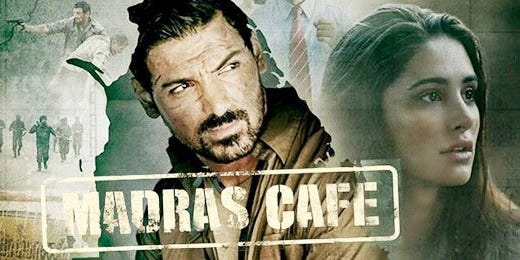Madras Cafe — Novel & bold yet not a landmark movie
Bollywood has perhaps never seen a film such as ‘Madras Cafe’. Set against the backdrop of the Sri Lankan civil war during the late 80s to…

Bollywood has perhaps never seen a film such as ‘Madras Cafe’. Set against the backdrop of the Sri Lankan civil war during the late 80s to 90s and focusing precisely on the assassination of Rajiv Gandhi, ‘Madras Cafe’ takes the Indian viewer into uncharted territories using a never-before-seen approach.
Starting at a blink-and-miss pace, MC does not slow down even for a moment and the average viewer needs to really keep up with the rapid happenings he is witness to. Major Vikram Singh (John Abraham) is an Indian Army Officer appointed by the Research & Analysis Wing (RAW) to play a role in safeguarding the Indian government’s intervention in Jaffna, despite the open intentions of the West to enter the region and further its capitalistic agenda. His main task is to curb Anna Bhaskaran (supposedly LTTE leader Prabhakaran). Unwittingly, Vikram gets drawn into the murky world of espionage and the web of deceit that lies within. The post interval portions deal with the plot to assassinate the “ex-PM” (a name repeated a little too often possibly to avoid controversy over taking direct names) and RAW’s efforts to prevent it eventually result in an end history is now a witness to.
Although John Abraham does a decent job, the only weakness of the film is John’s character Vikram, who neither comes across as witty nor tough. Being the mainstay of the film, the character never manages to surprise the viewer with unexpected turns and pretty much plays along to everything that happens around him. Another drawback could be how much and how fast things move in front of you, thereby draining you at the end, possibly relieving you of all connections to the plot a little after leaving the movie hall.
Director Shoojit Sircar follows up his brilliant ‘Vicky Donor’ with a film that deserves true applause for risking a story and an approach which most conventional Indian directors will be too scared to even attempt. The film explores Sri Lanka and the Tamil people, adding true depth compared to the otherwise usual South-Indian stereotypes in Indian Cinema (‘Chennai Express’ being a recent example). Not containing a single song in the movie, the camera keeps shuffling between what are supposedly Sri Lanka, Singapore, London and Bangkok. The frames look stunningly beautiful and the cinematographer and camera team deserve kudos for the exceptional natural beauty they have captured. The film almost possesses the feel of brisk and raw Hollywood war thrillers and would encourage Indian Directors to step out of their comfort zones even more taking full advantage of the multiplex boom to showcase their small and medium budget movies.
John Abraham puts in perhaps the best performance of his career but is let down by a weak, uni-dimensional character. Nargis Fakhri is appropriately cast as the Indian-British journalist Jaya and is miles better than her portrayal of ‘Heer’ in ‘Rockstar’. Her casting reminds one of Katrina in ‘Zindagi Na Milegi Dobara’ and reiterates how appropriate casting can change the feel of a film. Sircar manages a casting coup by getting Quiz-master Siddhartha Basu (of KBC fame) to play an important role of a senior bureaucrat at RAW. Another surprise debutante is Hindi journalist Dibang (Aaj Tak and NDTV 24x7) who debuts as an ex-RAW agent. Rashi Khanna is charming and endearing as Ruby — Vikram’s wife and reminds us of Sircar’s knack for casting wonderful, lesser known female leads, like in ‘Vicky Donor’. Prakash Belawasi is brilliant as Bala, Vikram’s corrupt boss in Jaffna.
All in all, ‘Madras Cafe’ is a never-before experience for an ordinary Hindi cinema viewer but its overdose of content and a weak central character prevent it from being the landmark film that it could’ve been!
3/5



